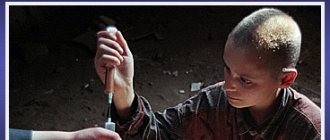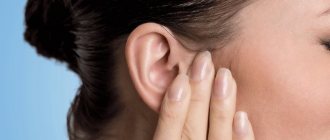Most parents, hearing that their baby is snoring in their sleep, begin to panic and rush to show their child to the doctor. Practice shows that in most cases, the anxiety of mothers and fathers turns out to be completely groundless. Nevertheless, it is necessary to understand the situation, and in the most urgent manner.
A baby may start snoring from the first day of life
Symptoms of newborn snoring
Many babies may wheeze, grunt, or snore. Because children's snoring is very different from that of an adult's, not everyone can identify with it. It is often confused with snoring. In the second case, we cannot talk about significant pathology. When the baby sniffles, it makes a soft sound, while when snoring, it makes a rattling sound, with light low-frequency vibrations.
Baby's snoring always worries parents a lot
A baby usually snores in the first months of life due to certain structural features of the nasopharynx: his nasal passages are still narrow, and the baby has to make significant efforts to draw in air. It is for this reason that even during feeding you can hear the newborn's glanders. When the child falls asleep, the snoring turns into snoring and begins to frighten the parents.
Causes of children's snoring
Snoring can occur in children too. At least 5% of children snore, while one or two young patients out of a hundred are diagnosed with obstructive sleep apnea syndrome.
- This complication of snoring is fraught with serious consequences:
- disorders of the child’s mental and physical development;
- the appearance of hyperactivity and aggressiveness, deterioration of social adaptation in the children's team.
- There are several main causes of childhood snoring and OSA:
- adenoids and chronic tonsillitis;
- allergic rhinitis;
- obesity, etc.
In order to cope with the disorder, it is necessary to consult a somnologist if snoring occurs and, especially, if breathing stops during sleep. A careful, comprehensive examination of the patient and work to eliminate the true causes of snoring are the keys to solving the problem in an absolute number of cases.
Causes of snoring in babies
A newborn baby laughs in his sleep - reasons and what parents should do
All the reasons why a baby sometimes snores can be divided into two large groups: physiological and pathological.
Physiological
Most often, a baby snores for physiological reasons. This occurs during sleep and is not accompanied by additional symptoms such as a runny nose or fever. Snoring occurs when inhaling while lying on your back. This is due to the fact that the baby’s palate is too soft, which is why it begins to vibrate when inhaling forcefully through the nose.
Older children, up to the age of two, snore due to the fact that the trachea and larynx are compressed by the thymus gland located in the area of the second to fourth ribs.
The reason why an infant may snore is sometimes due to insufficient oral hygiene. The mucus accumulates and then dries in the nasal passage, forming a crust and making it difficult for the child to breathe. An increased level of indoor air dryness also contributes to the formation of scabs on the nasal mucosa.
Pathological
It is worse when a baby snores during sleep due to existing pathologies. Most often, a child snores due to pathological changes in the adenoids or Hoan atresia (decreased nasal cavity patency).
A baby can snore for various reasons.
With adenoids or pathological changes in the pharyngeal tonsils, the passage of air is blocked and the respiratory process becomes difficult.
In some cases, a child snores if the mother suffered an infectious disease during pregnancy, had a difficult birth, or was carrying the baby in an unfavorable environmental environment.
Joan's atresia is an abnormality of intrauterine development of the fetus. In the initial months of gestation, the pharynx of the embryo is separated from the nasal cavity by a special membrane, which, under normal conditions, then dissolves, leaving the choanae (internal nostrils that connect the oral cavity to the pharynx). If the membrane persists, atresia occurs and the newborn baby snores.
Atresia can develop under the influence of one (or more) of the following prerequisites:
- bronchitis, pyelonephritis or diabetes mellitus in the mother;
- exposure to x-rays;
- genetic predisposition;
- infectious diseases in the mother during pregnancy.
Important ! In most cases, with atresia, the membrane degenerates into bone tissue, as a result of which snoring becomes chronic.
If you discover that your newborn regularly snores in his sleep, you should show him to the doctor. The specialist will examine the baby and be able to conclude whether the problem is pathological and prescribe adequate treatment.
About snoring in children
For most people, snoring is a problem that affects adults more than children.
What association does a person have with the word snoring? A snoring child, or a snoring grandfather or father? Most likely, the second one. However, when a child snores, it is a fairly common occurrence. Moreover, if a child snores in his sleep, then this happens when he has a cold. Video: Snoring. Causes and treatment methods
In this case, first of all, it is necessary to observe the child and try to establish the cause of the child’s snoring. To confirm such observations, it is worth consulting a pediatrician who will competently assess the child’s condition and prescribe effective treatment for snoring.
The dangers of snoring in newborns
What to do if your baby is choking and suffocating
There cannot be a clear answer to the question of why a baby snores. Most often, his nose is clogged, snot is stuck inside, or the mucous membrane is dry. A little less often, the cause is excess weight or certain physiological features. Only in last place are hormonal imbalances and pathologies of the nasopharynx.
A child's snoring is often a serious cause for concern.
Having discovered that a newborn baby snores, you should not expect that in a month another problem will go away on its own. If you do not start treating your baby immediately, it may worsen due to oxygen starvation or apnea. This may mean that due to impaired nasal breathing, insufficient oxygen reaches the brain during sleep. If this state of affairs continues for a long time, the metabolism inside the brain cells is disrupted, and its functions are reduced. As a result, the child becomes very absent-minded, inattentive, apathetic and lethargic. Sometimes he may show signs of unexplained aggression. As a result, if you continue to do nothing, encephalopathy will develop - damage to brain cells that is irreversible.
As for apnea, it is dangerous because the baby’s breathing may not be restored at all during sleep, and he will die. If the otolaryngologist has not identified any pathology, but severe snoring continues, it is recommended to show the child to an orthodontist. In this case, you will have to examine not only the throat, but also the mouth - perhaps the problem is caused by an incorrect bite.
When a child cannot sleep peacefully and breathe freely, hypoxia develops. It not only provokes fatigue, decreased activity and moodiness, but also affects the development of vital systems and organs. This may mean that snoring (in a worst-case scenario) could result in consequences such as hearing problems, urinary incontinence, or developmental delays.
Advice. In addition to the basic treatment of snoring, it is necessary to increase the baby’s immunity and carefully ensure that his nose is clean.
Measures to eliminate snoring in a baby
If the baby snores during sleep, and diagnostic procedures have not revealed any deviations from the norm, it is recommended to replace the pillow. It should be low, or it is better to remove this accessory altogether. Until a child is one year old, it is advisable to sleep on his side. In this position, the muscles of the pharynx are in a relaxed state. Timely and frequent ventilation of the room will prevent snoring.
Conservative treatment
If the ENT has identified a pathology, urgent therapy is required. A stuffy nose is treated with medication. Anatomical defects are eliminated surgically.
In case of allergies, the baby’s contact with the provoking factor is minimized. Additionally, a diet and antiallergic drugs are prescribed. If the symptoms of the reaction have not disappeared within a month, then the cause has been identified incorrectly. Re-examination is required.
When newborns snore in their sleep due to adenoids, urgent treatment is indicated. Otherwise, complications such as rhinitis, otitis media, and inflammation of the tonsils may develop. One-year-old children are treated by an ENT specialist. During therapy, infection of the nasopharynx must not be allowed.
If snoring bothers your baby at night, but there are no colds, a consultation with a nutritionist is scheduled. Obesity provokes the appearance of an excessive number of fat cells in the nasopharynx. This makes it difficult to breathe during sleep. If the diagnosis is confirmed, a diet is proposed to stabilize weight.
Operative therapy
Deviations of the nasal septum, polyps, and adenoids are dealt with using surgical methods. Within a few months, breathing returns to normal. Therapy for choanal atresia is prescribed taking into account its severity. To determine the degree of the disease, rhinoscopy is used, an X-ray of the skull is performed, and probing of the nasal cavity is performed.
In case of complete congenital atresia, immediate surgical intervention is indicated.
It is important to know! If the disease is partial, the surgical technique is replaced by a trocar puncture with insertion of a catheter. This manipulation has positive reviews.
For therapy to be successful, it must be carried out by a qualified specialist. The operation itself is prescribed when the child turns 6 years old.
Possibilities of traditional medicine
If an infant has a cold and snores in his sleep, you can use folk remedies. A consultation with a pediatrician is recommended in advance.
To remove dried crust, lubricate the nose with Vaseline oil. After a few minutes, breathing will become easier. If there is congestion, prepare carrot-beet juice. It is instilled into the nose, 1-2 drops. To prepare the product you will need:
- peel 1 medium-sized beet and 1 carrot;
- vegetables are grated;
- the pulp is squeezed out using gauze;
- the resulting juice is instilled with a pipette.
Drops are not used if the baby is allergic to carrots and/or beets.
What to do when your baby snores
Vomiting water in a child under 1 year of age - what to do when he feels sick
Despite the fact that snoring in a newborn is normal in most cases, it requires special attention. The first thing to do is to identify the cause. To do this, you should consult not only a pediatrician, but also a specialist such as an otolaryngologist. An effective solution to a breathing problem is to eliminate its immediate cause. Any therapy must be carried out as prescribed by a specialist and under his constant supervision. Self-medication in this case can have serious consequences.
If the cause of breathing problems is related to the age-related characteristics of a small child’s body, it is quite enough to simply change the position in which the baby falls asleep, turning him over on his stomach or side.
A dried crust in the nose that interferes with breathing will need to be lubricated with Vaseline or oil using a cotton swab or swab. This will help her move away, which will make breathing easier.
Prevention of snoring in infants
If the baby does not snore, this does not mean that parents should relax. In order for the child to develop normally and not experience difficulty breathing in the foreseeable future, he should be protected and some preventive measures should be taken. We are talking about the following procedures and actions:
- regular cleaning of the nasal cavities using cotton wool (you can, alternatively, use a wet aspirator);
- use drops that constrict blood vessels before going to bed (no more than once a day);
- from time to time moisturize the mucous membrane with saline solutions;
- monitor the baby's weight;
- provide the child with adequate rest and balanced nutrition;
- Carry out regular physical exercises with your child;
- often walk with your child in the fresh air;
- Put your baby to bed exclusively in pajamas made of high-quality natural fabric;
- Thoroughly ventilate your baby’s room every day.
Important! To further reduce the risk of snoring in newborns, they should be placed on their side in the crib.
The child’s sleeping place, as well as his correct position during sleep, are of great importance. In this regard, the baby should choose a not too soft mattress for the crib and a comfortable pillow. It is possible to use specialized positioners, with the help of which it will be much easier to provide the baby with the correct position during sleep.
Snoring is easier to prevent than to cure
Attention! Under no circumstances should split systems be installed in a child’s room. Cover heating radiators with a thick blanket and ventilate the room, avoiding drafts.
The famous pediatrician, Dr. Komarovsky, is sure that children's snoring is a dangerous and unusual phenomenon. Despite the fact that physiology may be the reason for its development, it is still better to play it safe and show the child to a doctor. Be sure to follow the recommended preventive measures.
Why does a child snore in his sleep?
There are many reasons why a child may snore in his sleep. Some are harmless and can be eliminated without much effort (the main thing is not to ignore them). Others talk about serious illnesses.
Doctors name several reasons for snoring in children:
- age (newborn babies often snore);
- allergies or colds accompanied by a runny nose;
- enlarged adenoids;
- excess weight;
- congenital pathologies of the nasopharynx;
- curvature of the new septum;
- Rolandic (nocturnal) epilepsy.
An examination with a doctor will help determine the cause. After clarification, treatment is prescribed. In cases of pathology - surgical intervention. Dr. Komarovsky talks about the main reasons why a child snores in his sleep:
Snoring in infants
Newborn children under two years old often snore due to an enlarged thymus gland, which is responsible for the formation of immunity - the thymus. It is located behind the sternum and during sleep can put pressure on the trachea and larynx. As a result, the child makes characteristic sounds. This condition is not considered a pathology; by the age of two, the thymus acquires a size corresponding to the rest of the organs and does not bother the baby. To stop your child from snoring, just turn him on his side.
Runny nose due to cold or allergies
Accumulation of mucus in the nasopharynx is a common cause of snoring. It can be caused by a cold or an allergic reaction. Eliminating the cause will help eliminate snoring.
Until the end of treatment, it is recommended to regularly (more often than usual) clean the nasal passages and remove accumulated mucus. With a clean nose, the baby will not snore.
Enlarged adenoids
Adenoids (tonsils), located in the nasopharynx, perform a protective function. For various reasons (colds, pathology), they can be increased. A pediatrician who has determined that they are the cause of the child’s snoring refers the patient to an ENT doctor, who in turn prescribes medication. If this does not help, a decision is made to remove the adenoids surgically.
Excess weight
Overweight children are also more likely to snore in their sleep. The body weight is so large that it causes narrowing of the airways. Prescribing a diet and losing weight will help get rid of snoring.
Congenital pathologies of the nasopharynx
Children born with nasopharyngeal pathology often snore in their sleep. “Cleft palate”, “cleft lip”, narrowing or overgrowth of the nasal cavity are treated with surgical correction. After correcting the pathology, snoring stops.
Deviated nasal septum
The child snores in his sleep, although there is no snot. This may be a curvature of the nasal septum, which most often is acquired (injury). Less often it is congenital. Treatment can only be done surgically.
Rolandic epilepsy
Short-term (from a few seconds to 2-3 minutes) bouts of snoring may be associated with rolandic (or nocturnal) epilepsy. It is confirmed in 21 cases per 100,000 applicants. It is difficult to detect, since attacks occur at night, when children and people around them are sleeping. In most cases, Rolandic epilepsy is considered benign, and it goes away on its own in 15–18 years. Only 15% of detected diseases require serious treatment.











